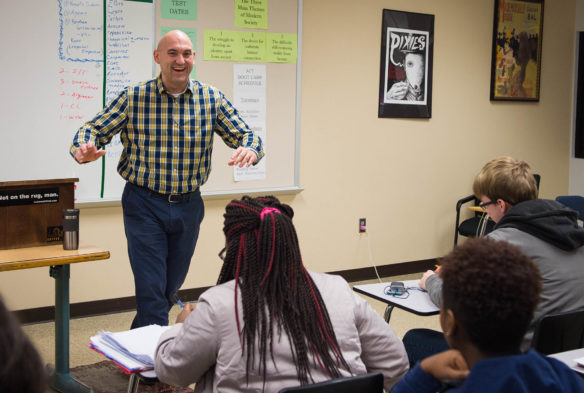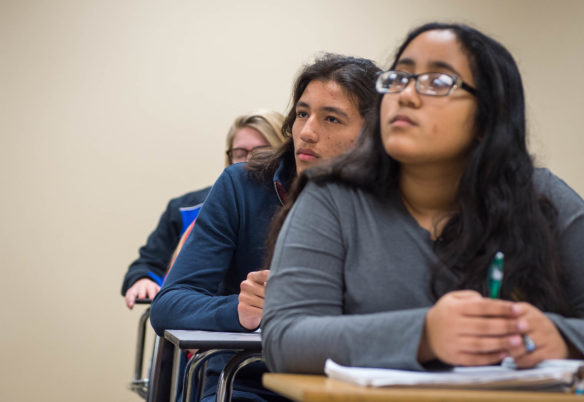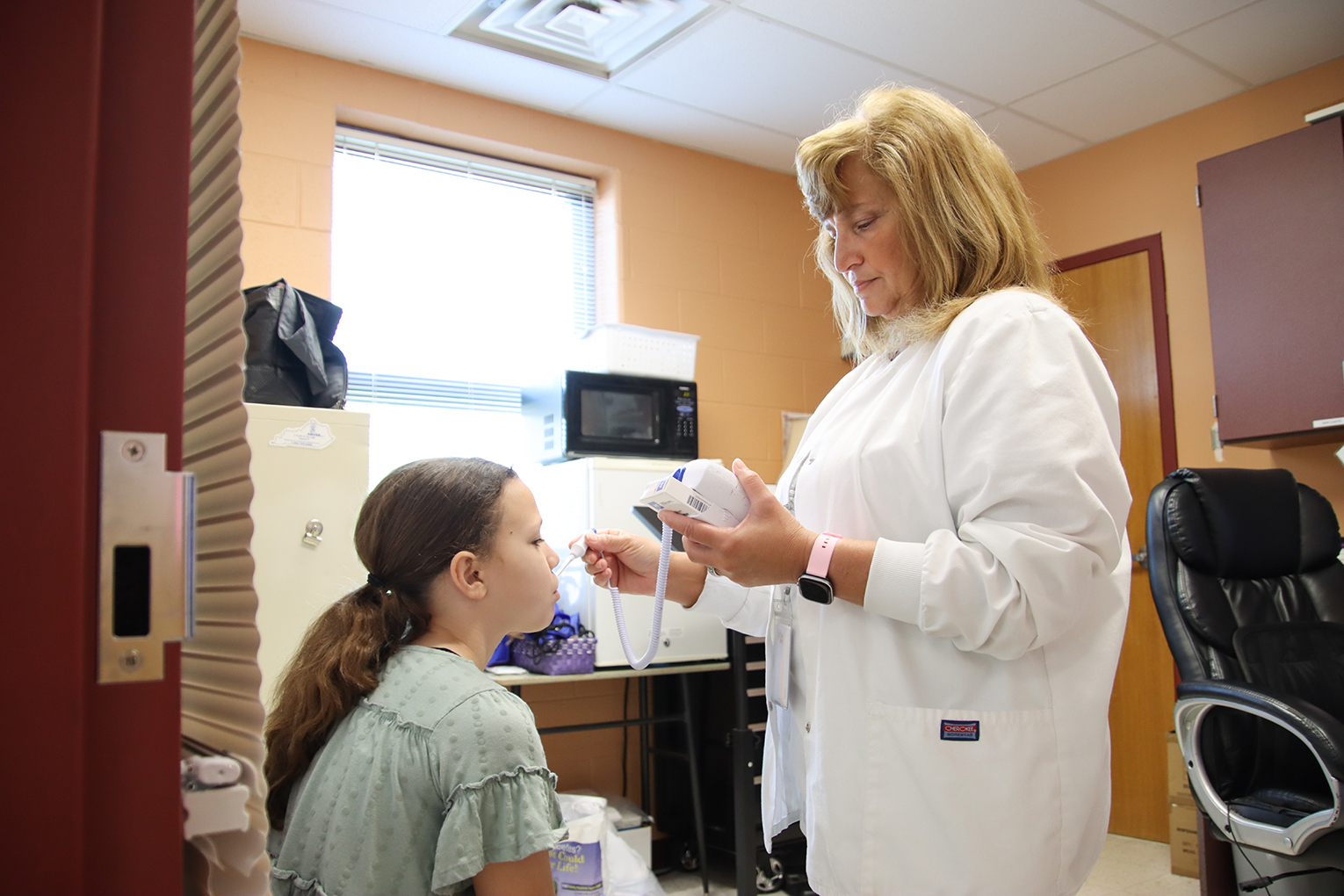
Beau Baker, an Advanced Placement arts and English teacher at Fern Creek High School (Jefferson County), speaks to senior students in the Ivy Plus Academy. Baker directs the academy, which seeks to help students get into some of the nation’s top colleges and get scholarship money to pay for those schools.
Photo by Bobby Ellis, Feb. 14, 2017
By Mike Marsee
michael.marsee@education.ky.gov
Beau Baker has found his calling as a matchmaker.
On one hand, he has students who are capable of reaching greater heights than they realize. On the other, he has elite colleges who are looking for students just like the ones he teaches.
He is bringing those two parties together through the Ivy Plus Academy, a program that is helping students at Fern Creek High School (Jefferson County) find their way to some of the nation’s top colleges and find much of the money they’ll need to pay for those schools.
Baker is an Advanced Placement teacher at Fern Creek High and the dean of the Ivy Plus Academy. He is selling his students and their families on what is possible academically, while selling admissions counselors at some pretty selective schools on what those students have to offer.
“The work that he’s doing is incredible, not just inside the classroom but outside, networking for these kids,” Fern Creek High Principal Nathan Meyer said. “He’s been able to create partnerships with these elite colleges, and he serves as an intermediary between the families and these schools.”
Jennifer Pusateri, an education consultant and the state AP coordinator with the Kentucky Department of Education, said Baker “has created the perfect storm” by combining three vital components in the program.
“He is preparing students for success in college through rigorous, college-level coursework like Advanced Placement, acting as an adviser to guide students and families through the intricate college admissions process and building relationships with students in an effort to connect them with the right school based on their personality, background and course of study,” Pusateri said.
The Ivy Plus Academy had 11 success stories in its first year, with its 2016 graduates earning a total of $2.6 million in scholarship money to attend schools such as Middlebury, Rhodes and Centre colleges and Rose-Hulman Institute of Technology.
The 15 seniors in the program this year are working toward some excellent educational opportunities as well, with acceptance letters rolling in from selective colleges from coast to coast.
The academy has grown to include about 100 students from all four high school grades, with a goal of serving up to 200 students per year.
“This is about opportunities and advantage,” Baker said. “Every kid ought to get the same opportunity, and every kid ought to have access to the same advantages if they work at it.”
The first two groups of seniors – those who graduated in 2016 and those who will graduate this spring – were recruited based on academic performance and faculty recommendations. Students now must apply to the academy, and they can do so as early as their 8th-grade year.
“College is not really in the minds of 8th-graders. It was something I wish I would’ve had someone telling me, stressing that your high school is leading you toward college,” said Makenzie Dries, a future English major and film minor who has been accepted at Centre and Denison College.
“Ivy-plus” schools include not only the traditional Ivy League – such as the University of Pennsylvania, where one 2016 graduate is studying – but any number of schools that might be considered among the top colleges in the country or a top college in a specialized field of study.
“It’s not all about prestige,” Fern Creek Assistant Principal Rebecca Nicolas said. “We don’t really care if you go to an Ivy-plus school. What we want you to do is find the best fit that’s going to challenge you as a human.”
That might be a school like Drexel University, where Alexis Harding could be headed next year. The Philadelphia school is one of the top 10 schools in the world for fashion design, which is what Harding wants to study.
“That’s her passion, so when she said, ‘That’s what I want to do,’ then we sat down and researched the best fashion design schools we could get her in and the type of environment that was going to set her up for success,” Baker said. “She had to submit her own portfolio and put plates together, and she had no training. But she had that wherewithal, that intellectual courage to go after that instead of just settling.”
“Baker definitely opens us up to a whole new variety of options,” Harding said. “Before I talked to him, I didn’t even know Drexel existed. He pushes you to go further than you push yourself, and it’s really encouraging.”
“He’s changing lives and changing the trajectory of their education,” Nicolas said.

Seniors in the Ivy Plus Academy take notes while listening to Beau Baker. The academy has helped introduce students to Ivy League colleges and universities that they may not otherwise have thought about attending.
Photo by Bobby Ellis, Feb. 14, 2017
Baker said it isn’t enough to prepare students for college; it’s also important to find the right schools for them based on their personality, their skill set and what they want to study.
“Our responsibility on that assembly line of education doesn’t end on the day they graduate,” he said. “We have a responsibility to make sure they’re qualified to go somewhere and then to succeed wherever it is they go when they leave here.”
One of the first steps is getting students and their families to look beyond the schools that are familiar or close to home or easier to get into or less expensive.
“I’m going to Wake Forest, which is my dream school. If I hadn’t been in Ivy Plus, I would have gone to Louisville or Kentucky,” said senior Hannah Schmidt, who will study political science and English at the North Carolina school. “It’s still surreal that I’m going to the school that’s a perfect fit for me. It’s home, basically.”
In the Ivy Plus Academy, students travel as a cohort through their core classes, take multiple AP and dual-credit classes and get access to one-on-one college counseling services that include application assistance, financial aid support and extensive college visits, including group visits.
“I knew nothing about the whole application process before this program,” said Parker Yahnig, a future pharmacy student who was recently accepted to Wofford College. “Baker introduced me to that, and he introduced me to colleges outside the state that were bigger – or smaller in some cases. I was worried about costs, but he told me all about financial aid and scholarships.”
There is also an emphasis on time management as students try to stay ahead of the many deadlines for applications and aid.
“Applying to these schools takes a lot more work, but he does a good job of keeping us on task and letting us know what we need to get done,” said Iishe Davis, who will attend Scripps College in California.
The academy was born out of Baker’s informal involvement in counseling his students on colleges early in his career at Fern Creek. He directs the program in addition to teaching a full class load.
“It does take a good amount of my time, but the amount of support I have for this program is immense. None of this gets done without the vision of Dr. Nicolas and Dr. Myer,” he said.
In summer 2015, Baker identified 70 to 80 top schools he wanted to work with and emailed their regional admissions counselors to tell them he had just the type of students they were looking for: driven, well-rounded students from an urban school at which 53 percent of the students are minorities and 65 percent qualify for free or reduced-price meals.
“Within 24 hours I had heard from 40 schools,” he said. “Schools need our kid more than our kid needs that school.”
One California college had never sent a representative to Kentucky, and its representative asked Baker about other places she might visit.
“I told her, ‘That’s the entire state of Kentucky.’ The vast majority of kids here are going to be first-generation college students, they’re going to be lower income, a lot of them are going to be minority students, and by and large they’re going to have a disadvantaged story to tell,” Baker said.
“I think Fern Creek is indicative of just about every school in the state. You could do this program everywhere. The fact that that’s not happening is something I’d like to see change.”
Baker said he’s confident that what he has done can be replicated at any Kentucky high school.
“Get to know your kids and their strengths, and then find the schools to fit them,” he said. “Talk to your kids and their parents about what their fears are about college. Start locally and then branch out, and start small.
“If I can do it, anybody can do it.”
MORE INFO …
Beau Baker beau.baker@jefferson.kyschools.us
Rebecca Nicolas rebecca.nicolas@jefferson.kyschools.us







Leave A Comment